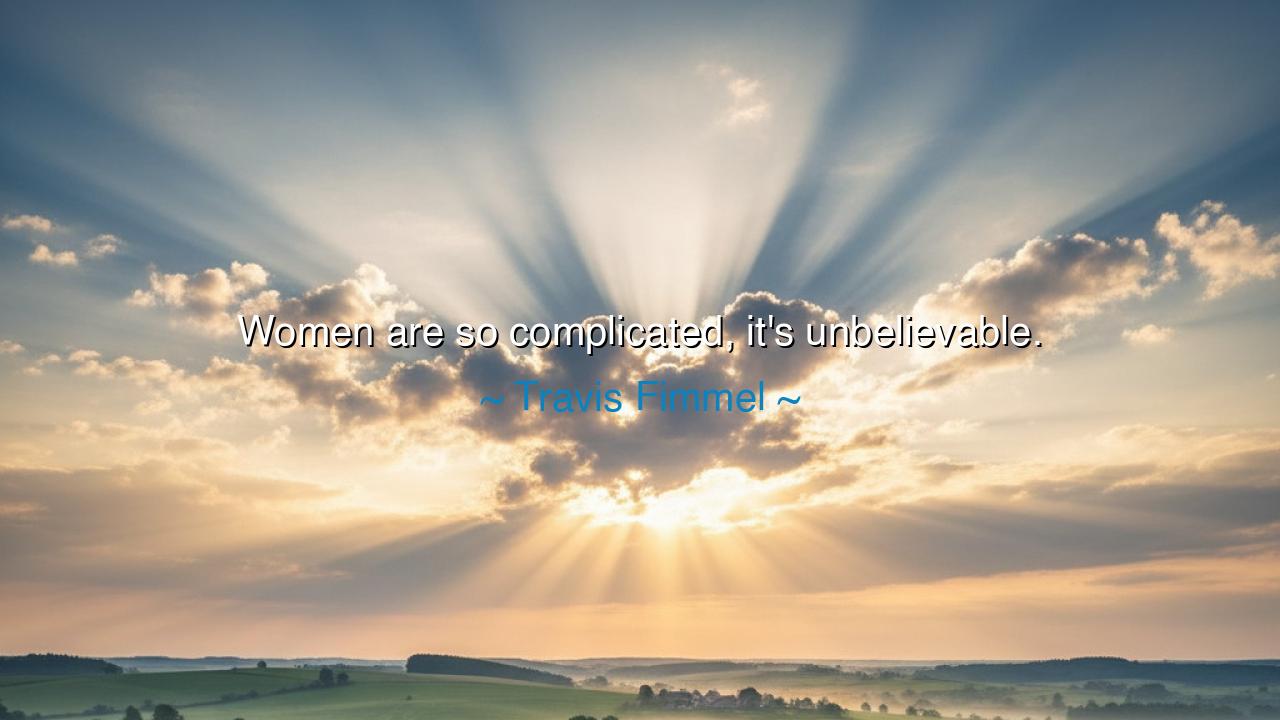
Women are so complicated, it's unbelievable.






Hear the words of Travis Fimmel, spoken with awe and bewilderment: “Women are so complicated, it’s unbelievable.” Though simple in form, these words carry a weight known across ages—that the depths of womanhood cannot be easily charted. For within every woman lies a tapestry of strength and softness, reason and intuition, endurance and vulnerability, woven so intricately that no single thread defines the whole.
The word complicated here is not to be taken as weakness, but as richness. That which is simple may be understood in a glance, but that which is layered demands reverence. The lives of women, shaped by centuries of struggle and expectation, by dreams both fulfilled and denied, cannot be reduced to shallow caricature. Their spirits, like oceans, conceal storms and calm, mystery and light, each unfolding to those who approach with patience and respect.
History shows us many examples. Consider Cleopatra of Egypt, remembered by some as merely a seductress, but in truth a ruler of fierce intellect and strategy. She spoke many languages, held her kingdom against empires, and embodied the complicated interplay of politics, love, and survival. To the simple-minded, she was “unbelievable”; to the wise, she was a testament to the infinite capacities of women.
So too with Joan of Arc, a peasant girl who heard divine voices and led armies to victory. Was she saint or soldier, visionary or madwoman? She was all of these and more, her life too intricate for easy categories. Her story reminds us that the complexity of women is not confusion, but the mark of depth—a strength that defies narrow understanding.
Therefore, let this truth be passed down: to call women complicated is to acknowledge their vastness, the many dimensions that make them whole. It is not unbelief, but wonder, that such fullness can exist in one being. And if men find themselves baffled, let them not despair, but rejoice—for the beauty of women lies not in being simple, but in being endlessly profound, a reflection of life’s own mystery.






HBHue Bong
While Travis Fimmel’s quote may seem to express frustration, I wonder if it’s a reflection of society's struggle to understand women's diverse experiences and emotions. Why is there such an emphasis on labeling women as 'complicated'? Could it be that societal expectations and roles often make it harder for people to truly understand women, and perhaps a better approach would be to recognize this complexity as part of the human condition?
CDNguyen Cong Danh
This quote made me think about the tendency to stereotype women as 'complicated.' In reality, all individuals are complex and multifaceted. Does this reflect how we sometimes dismiss or misunderstand women’s behaviors or emotions, categorizing them as confusing rather than acknowledging the full depth of their experiences? How do we shift our mindset to appreciate complexity as a trait of everyone, not just women?
NMNgoc Minh
The idea that women are 'complicated' can be problematic because it may imply they are somehow less rational or harder to deal with. But doesn’t every human being have layers? How do we change this narrative and recognize that complexity in people—whether women, men, or anyone else—is a natural part of being human and should be embraced rather than stigmatized?
NSNam SiNo
This statement raises the question of what we mean by 'complicated.' Is complexity necessarily a flaw, or does it signify individuality and emotional depth? By focusing on complexity in women, does Fimmel overlook the complexities in men and human beings in general? Are we reinforcing outdated gender stereotypes by labeling women as difficult to understand rather than celebrating their diversity?
VBCong Vinh Bui
Travis Fimmel’s comment seems to reinforce a common stereotype that women are inherently complex or difficult to understand. But is this complexity really a negative thing, or does it reflect the richness and depth of human experience? Should we embrace the idea that people, regardless of gender, are multifaceted and unique rather than oversimplifying their nature?